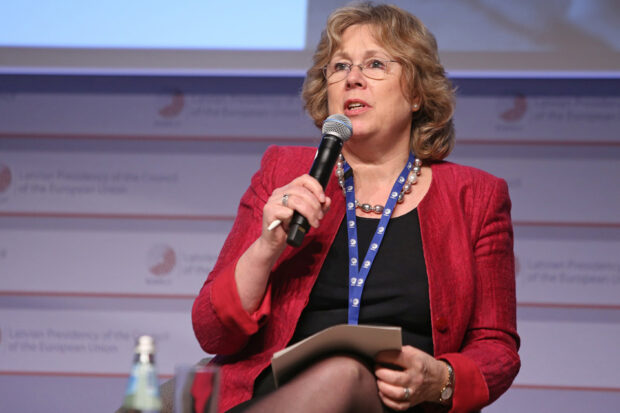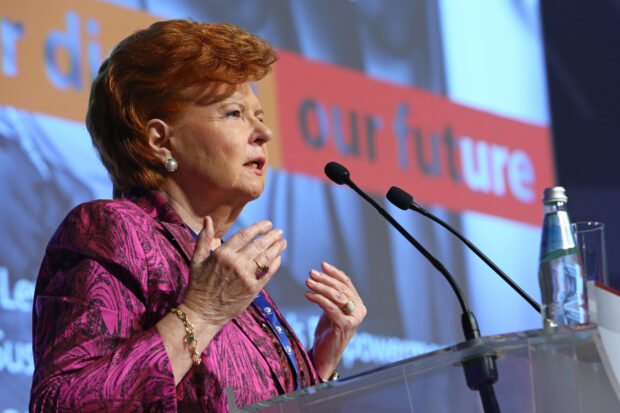Coming back from Latvia from a conference on women and sustainable development last week, a voice welcomed us on to Ryanair. “This is your captain speaking”, she said.
Familiar enough words, but less so from a woman.
In the week that Kat Woodruffe and her father David made British Airways history as their first father-daughter pilot team, only five per cent of pilots worldwide are women.
That is true of many occupations. I recall the other day a little boy getting on a bus, then standing stock still because the driver was a woman. “Can a lady drive a bus?” he asked, nervously. He was reassured that she could, and when he successfully arrived at his bus stop with his granny, he waved enthusiastically at the driver who had safely brought him there.

As we celebrate International Women’s Day, the inequalities that still persist seem sometimes overwhelming. At least 35 per cent of women worldwide have experienced either physical or sexual violence from an intimate partner. More than 133 million girls and women have experienced female genital mutilation. And while women make up 43 per cent of the agricultural workforce, they own only one per cent of the land.
We know the litany of inequality.
And that is why I was delighted that Latvia had chosen, as part of their Presidency of the EU, to hold the conference that they did. The EU is a major contributor in development. If we can ensure that the EU, and its member states, recognise that women and girls need to be front and centre in development – as in fact DFID recognises – and then to deliver on that, the effect could be transformational.
An opening speaker was the former Latvian president, Professor Vaira Vike-Freiberga. I have never heard her before – and that is my huge loss. She was stunning, cutting through the usual platitudes. She pointed out that when she was president, at one point it was mooted that the prime minister might also be a woman. “But that is not possible”, someone said to her. “We already have a woman president – we can’t have the two key leadership positions both held by the same sex.” She pointed out that round the world, strangely enough, there seemed to be many instances where prime ministers and presidents were of the same sex…

The Latvian conference brought together member states, NGOs and multilateral organisations. There was a very keen sense that this year, as we work out a set of goals to replace the Millennium Development Goals, was key. And addressing gender equality had to be central.
I was very struck by Jon Lomøy, OECD Development Cooperation Director, pointing out that we used to believe that poverty would always be with us. But since 2000, absolute poverty had halved. Now we had the realistic aim of eradicating extreme poverty by 2030. Thus, he said, the assumption that gender inequality will always with us must also in this 21st century be challenged and overturned.
A major part of the conference was to try to shape what the EU did – it has a Gender Action Plan, which it is seeking to renew. Simon Maxwell (formerly head of the UK’s Overseas Development Institute, and a formidable chair who insists on full engagement from the audience) was determined that we should all contribute actions that would make a difference in how the EU delivered its Gender Action Plan. What emerged, besides specific areas which must be central, including women’s sexual and reproductive rights, was a considerable emphasis on both measurements and results.
It was therefore excellent to hear Neven Mimica, European Commissioner for International Cooperation and Development, state his personal commitment to embed gender at the heart of EU development and to establish a results framework, to track and report on progress.
That may sound dry. But it is what makes the difference. It is by highlighting how many girls are actually in school, and whether, for example, they have access to a high enough standard of education (and family, social and economic support) to go on to secondary school, that we will see what we need to do. Or by seeing how many women are able to access family planning services when they wish to do this. Or how many hold land rights, and what prevents those who do not from doing so.
And moving closer to a world when a girl can aspire to be president of her country, or a pilot, or a bus driver, or whatever it is that she wishes to do, is what this meeting was all about.

1 comment
Comment by Joе posted on
I truly believe in gender equality! I'm glad to see more and more people around the world are actually doing something about it, because gender equality is a major part of the solution for all problems of the humanity. Sadly, a lot of people are happy with thing the way they are.